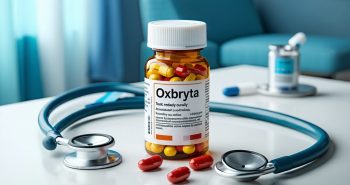What Should You Know About Voxelotor Also Known as Oxbryta

I first learned about voxelotor (Oxbryta) through conversations with individuals who live with sickle cell disease (SCD). They shared how this prescription medication, approved in 2019, initially brought hope by improving hemoglobin levels. Unfortunately, I also discovered that Pfizer voluntarily withdrew the drug from the market in 2024 due to serious safety concerns. Since then, many lawsuits have emerged, and people are questioning whether they might qualify for legal compensation. I would like to offer what I have found, from its early promise to its eventual recall, so that you can decide whether it might be worth pursuing legal advice.
Table of Contents:
Explore voxelotor’s background
Voxelotor is a hemoglobin S polymerization inhibitor. For someone with SCD, this medication aimed to reduce the sickling of red blood cells, which typically results from an abnormal type of hemoglobin (called hemoglobin S). When red blood cells become sickled, they can block small blood vessels, potentially triggering painful episodes known as vaso-occlusive crises and damaging organs over time.
Before its withdrawal, voxelotor’s journey was filled with both optimism and caution. In 2019, it became the first drug approved by the FDA for sickle cell disease that specifically targeted hemoglobin S. It was considered an important development because approximately 100,000 people in the United States, along with an estimated 20 million worldwide, are affected by SCD. Although physicians, patients, and caregivers wanted a better solution, healthcare professionals still kept a watchful eye on side effects and real-world outcomes.
Below is a brief table of some facts about voxelotor that I gathered from clinical data and official announcements:
| Key Fact | Details |
|---|---|
| FDA approval year | 2019 |
| Voluntary market withdrawal | September 2024 |
| Drug class | Hemoglobin S polymerization inhibitor |
| Common dosage | 1,500 mg once daily (for ages 12 and older) |
| Initial clinical trial size | 274 participants (adults and children 12 years or older) |
| Mechanism of action | Prevents sickling of RBCs by stabilizing oxygen binding in hemoglobin |
Though this table shows some positive milestones, I also noticed that fully understanding voxelotor required looking deeper into follow-up studies. For example, a key 24-week clinical study included 274 people with SCD. Results showed that many participants taking voxelotor experienced a hemoglobin increase of at least 1 gram per deciliter (g/dL). At the time, that improvement was a promising sign.
Yet real-world experience can differ from clinical trials. Only after postmarketing research did new, more troubling data come to light, suggesting elevated risks. I believe it is always wise to weigh benefits against potential harms, which leads directly to why this medication disappeared from pharmacy shelves so suddenly.
Understand the recall
If you are wondering why voxelotor vanished from the marketplace, the main reason involves postmarketing safety findings. In September 2024, Pfizer voluntarily withdrew the medication from circulation because the risks were determined to outweigh the benefits. Concerns grew out of a mixture of clinical trial data and adverse event reports, including some instances of serious complications. An FDA review also prompted more questions about voxelotor’s safety profile.
Until that point, doctors and patients had continued using voxelotor, relying on its FDA-approved status. The FDA’s original nod came through accelerated approval, which is usually granted when a treatment shows promise for a serious or life-threatening condition with limited options. While accelerated approvals have certain advantages—most importantly, faster access to novel treatments—they also require ongoing studies to confirm long-term safety and effectiveness. Sadly, in voxelotor’s case, these updated studies shed light on more frequent complications than initially reported.
I know from reading the FDA statements that healthcare professionals were urged to stop prescribing voxelotor immediately. The presence of serious risks, such as possible blood vessel blockages, stroke, and even organ damage, raised alarm. In addition, some data suggested that more than half of patients in one study failed to complete all required steps, which made interpreting the results even more challenging. As clinical and real-world data converged, the voluntary recall became the logical and responsible step.
If you want a short breakdown of events, you can see the timeline on the oxbryta recall page. Even though the recall removed voxelotor from the market, people who had been depending on it for SCD relief faced the question of what to do next.
Recognize potential side effects
From what I have gathered, voxelotor was designed to help prevent sickling by keeping red blood cells in their normal shape. Early on, some patients indeed saw improvements in hemoglobin levels and energy. However, the new data showed that this upside might have come with a higher risk of complications, including:
- Stroke-like symptoms and actual strokes
- Blood vessel blockages (vaso-occlusive crises)
- Organ damage due to poor oxygen flow
- Severe allergic reactions in a small percentage of patients
- Further complications tied to abnormal clotting
In clinical trials, allergic reactions were reported by under 1% of participants, but any suspected allergic response should be taken seriously. If you experienced rashes, swelling, or breathing difficulties after taking voxelotor, seeking medical advice was crucial. These safety signals are part of why doctors do not prescribe voxelotor anymore.
Some patients also reported that the medication failed to alleviate their condition or made them feel worse. Others shared that any slight improvement in hemoglobin levels did not outweigh the uncertainty and worry about long-term effects. To explore more details about these problems, check the oxbryta side effects resource.
One unfortunate reality in drug development is that complications might remain hidden until a medication is widely used. Once thousands of people start taking it, patterns can emerge—particularly dangerous patterns. It seems that the impetus behind the voluntary withdrawal was precisely these additional concerns, which overshadowed the initial optimism surrounding voxelotor’s unique approach to managing sickle cell disease.
Weigh legal options
Now, I have also seen many reports of lawsuits against Pfizer and Global Blood Therapeutics. Plaintiffs allege that the manufacturers knew more about potential problems with voxelotor than they disclosed. They argue that physicians and patients were not adequately warned about severe complications, and that people suffered strokes, organ damage, or even lost their lives as a result. It is always difficult to prove negligence in pharmaceutical cases, but the legal system is the current path for those seeking accountability.
Given the wave of lawsuits, it is natural to wonder if you might have a valid claim, especially if you or someone you love took this medication and later experienced severe side effects. One big step can be to consult with an attorney who focuses on dangerous drug cases. They will often explore whether you have the medical records, timeline, and evidence to support a lawsuit. Many law firms provide a free case review or initial consultation to let you know about your potential eligibility.
I do not provide legal advice, but I encourage anyone feeling uncertain to consider a quick legal check. For easy access, you can get a free case review at Legal Claim Assistant. This resource can help you see if you might qualify for compensation. If you feel overwhelmed, that is understandable, but taking that first step could offer some direction about what to do next.
Common issues involved in these suits include:
- Failing to disclose serious risks in a timely manner
- Giving medical professionals incomplete safety data
- Causing unwitting patients to endure side effects, including stroke or organ damage
If any of these match your experience, talking to someone who can delve into the legal details might be worthwhile. Lawsuits vary in outcome and timeline, so there is no guarantee of success. However, a successful claim might recoup medical costs, lost wages, or compensation for pain and suffering.
Move forward with confidence
I completely understand if learning that a once-promising drug carried hidden dangers leaves you feeling upset or betrayed. You are not alone, and it is okay to take some time to evaluate your choices. With voxelotor off the market, your daily health considerations might have shifted, and your understanding of how to manage SCD might also need updating. This change can be challenging, especially for individuals who had pinned their hopes on the effectiveness of voxelotor.
Good news—there are additional therapies for sickle cell disease, such as hydroxyurea or newer biologics under investigation. Your doctor might recommend other standard treatments or enroll you in an alternative therapy program, depending on the severity of your condition and your overall health profile. My advice is to keep an open and honest line of communication with your healthcare team. They can watch for any lingering complications that might be associated with your time on voxelotor.
Here are a few tips I have found helpful when dealing with an uncertain drug situation:
- Gather your documentation. Keep copies of your medical records, test results, and particularly any records that link your timeline of side effects to voxelotor usage.
- Monitor any symptoms. Let your healthcare provider know if you felt new or worsening signs after you stopped taking the drug.
- Contact a legal counselor if you suspect harm. Requesting a free consultation is typically the fastest way to learn about your options.
- Stay informed. Keep up with new announcements from the FDA or other regulatory bodies about ongoing SCD treatments.
Sometimes, the key to moving forward is staying well-informed. If you are grappling with questions about how to approach a claim, I believe that a conversation with a legal professional can make a difference. Check your eligibility at Legal Claim Assistant or speak directly with a law firm experienced in defective drug cases. If you find out you have a potential claim, you may feel less alone and more proactive in protecting your future well-being.
A brief recap before you decide
- Voxelotor appeared innovative, targeting hemoglobin S to help manage sickle cell disease.
- A 24-week clinical study originally showed improvement in hemoglobin levels by at least 1 g/dL.
- Pfizer voluntarily withdrew Oxbryta in September 2024 due to serious safety risks.
- People are now filing lawsuits, claiming they were not sufficiently warned of complications ranging from blood vessel blockages to strokes.
- If you suspect harm, a free case review might help you understand your legal options.
Deciding to take legal action is always personal, and I respect that not everyone will feel the same. Feel free to consult with your healthcare provider about transitioning to other SCD treatments. If you do move forward with a claim, gathering the right information is essential. I am confident that with thoughtful research and professional guidance, you can navigate this process and make decisions that serve your best interests in the long run.
Ultimately, it is your health and your peace of mind on the line. I hope this overview clarifies what went wrong with voxelotor, why it was withdrawn, and how you might explore compensation if you have been harmed. While no one can change the past, I believe you deserve the facts to shape a better path ahead. If you have lingering concerns, take that first step toward a proper medical and legal review. You may find both the care you need and the answers you have been searching for.










